8 October 2021
The situation in Afghanistan presents both risks and opportunities to non-Western powers; how they choose to interact with the new Taliban government will shape the country’s future.
During the 19th century, Afghanistan became a key chess square in the geostrategic competition between Great Britain and Russia. This contest, which generated multiple wars, became known as the Great Game. However, the end of the Anglo-Russian tug of war in the region did not spell the end of foreign meddling in Afghanistan. In 1979, the Soviet Union deployed its forces to support the ruling People’s Democratic Party of Afghanistan (PDPA) against a growing insurgency. Again, in 2001, the US invaded Afghanistan with its allies and removed the Taliban from power. After two decades of US involvement, the Americans withdrew, and the Taliban rapidly gained ground against the US-supported government in Kabul. By August 2021, the Taliban had captured Kabul and were again ruling the county.
Whilst the world has been preoccupied with frantic images of harried transport planes and desperate Afghans at the Kabul airport; the leaders of non-Western powers have had to consider how the new Taliban government will impact their interests in the war-torn country. It is these non-Western powers who are now most likely to inherit the seemingly unceasing Great Game in Afghanistan.
Some states – chiefly China, Iran, and Russia – have welcomed the American exit and have not wasted the opportunity to lambast Washington for the debacle in Afghanistan. Nevertheless, the Taliban have been met with a lukewarm reception at best. Although China, Iran, Russia, India, and Pakistan are all seemingly willing to engage with the Taliban-ruled Islamic Emirate of Afghanistan, they are not sure quite how much they can trust them.
An Afghanistan, no longer subject to a US-led Western presence, presents these states with risk and opportunity in equal measure. A sufficiently stable Afghanistan could become an important hub in a wider Southern and Central Asian economic network, but it could also quickly devolve into yet another civil war.
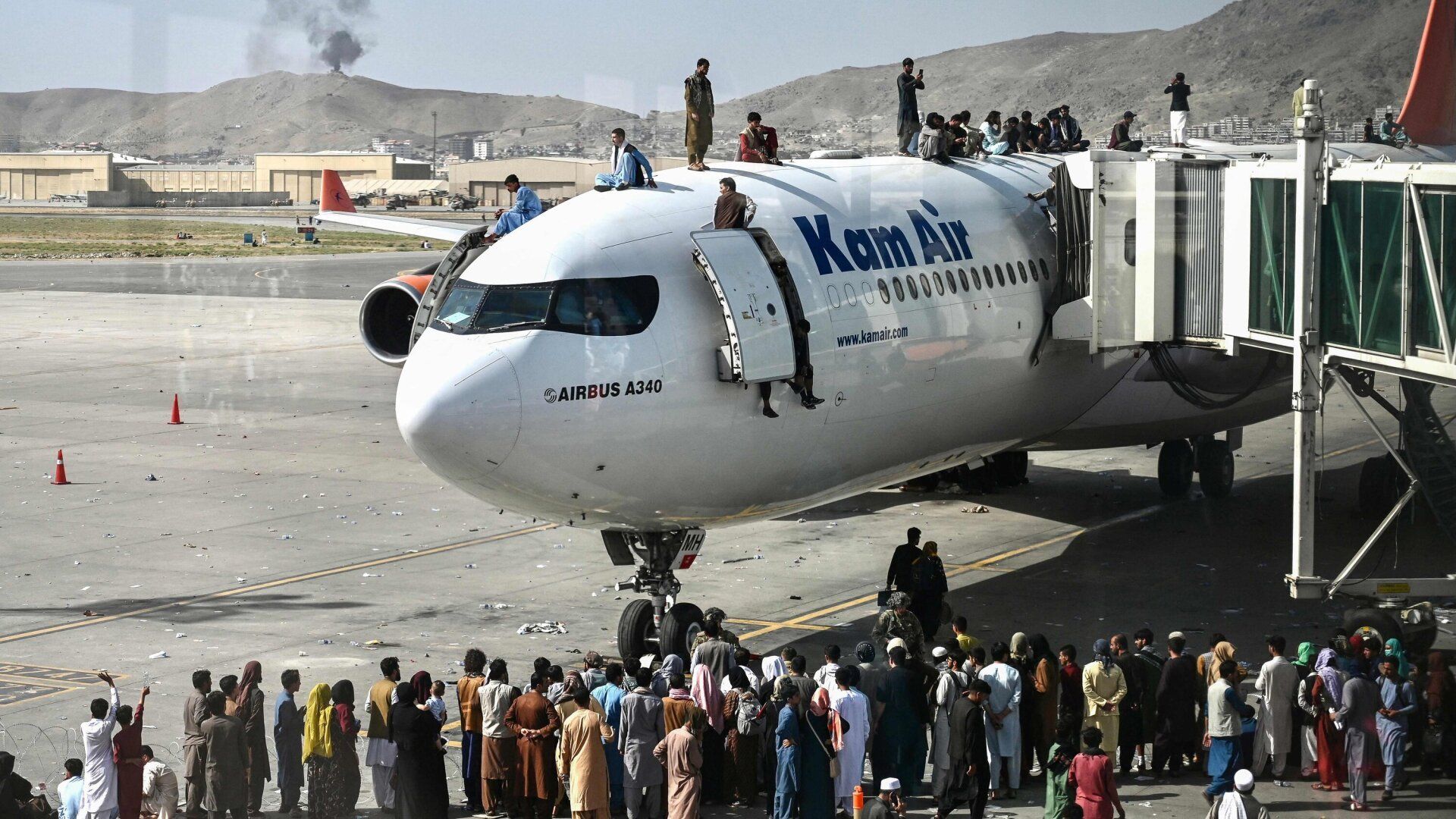
^ Afghans scramble to board planes leaving from Kabul airport in the wake of the Taliban takeover in August 2021. (Source: AFP)
China
Officials from the Communist Party of China have wasted no time castigating the US for its messy withdrawal from Afghanistan. During a press conference in August, Director of the Foreign Ministry of China Hua Chunying said that the US had created ‘an awful mess of unrest, division and broken families’ and that ‘America’s strength and role is destruction, not construction.’ Similarly, Chinese state media has heralded Washington’s messy exit from the Afghan theatre as a sure sign that the US is in decline, with Xinhua calling it ‘the last dusk of empire’.
Even before the Taliban toppled the US-backed government in Kabul, Chinese officials had been meeting with Taliban delegates. In July this year, Chinese Foreign Minister Yang Wi met with Taliban Political Commission Mullah Abdul Ghani Baradar in Tianjin. Now that the Taliban are in power, China is cautiously continuing to hold talks with the Taliban in order to secure its economic and security interests in the wider region. For their part, the Taliban are keen to build ties with Beijing. Taliban spokesman Zabihullah Mujahid told Italian newspaper La Repubblica: ‘China is our most important partner and represents a fundamental and extraordinary opportunity for us.’
If the Taliban can impose a sufficiently stable security situation in the country, Afghanistan may become an important node in China’s increasingly expansive Eurasian economic projects. In particular, the China-Pakistan Economic corridor (CPEC) – a major part of China’s Belt and Road Initiative (BRI) – would benefit immensely from a stabilised Afghanistan. China has spent billions on infrastructure projects in Pakistan, including the Gwadar port in southern Pakistan. However, for the port to become a lucrative energy terminal, pipelines must pass from Central Asia, through Afghanistan to Gwadar. Thus far, Afghanistan’s difficult geography and unstable security situation have prevented this.
The Taliban will certainly be keen to receive Chinese investment, but this will require them to implement a sufficient degree of security throughout the country. In 2016, a Memorandum of Understanding was signed between the now deposed Afghan government and China on the BRI, so the foundations for an economic relationship are there. However, the Taliban will need to reassure Chinese investors that any stakes in the country are not bad bets. The Taliban’s fundamentalism and general disdain for modernity may also inhibit elements of the BRI pertaining to education, healthcare, and science.
In terms of facilitating an economic relationship with the Taliban, China faces some limitations. The BRI has largely favoured development led by large multinational and national companies, whereas Afghanistan’s underdeveloped economy is predominately informal and centred on small businesses. Even where bigger business opportunities present themselves, there is a risk that Chinese investments and capital could be swallowed up by the sinkhole of Afghan corruption.
Another issue is that China may struggle to establish the necessary business connections to begin with. Unlike many of Afghanistan’s neighbours, a large Afghan diaspora who could establish local business and trading links does not reside within China. Most Afghans in China are either students or individual traders living there on a short-term basis. China may therefore have to rely more on Pakistan to help establish viable Sino-Afghan connections.
Although the US exit may open opportunities for China, there are few guarantees the Taliban will maintain an adequate security situation in Afghanistan. The Communist Party of China has an uneasy relationship with Muslim minorities in its own country, particularly in Xinjiang Province. Since 2017, China has detained more than one million Muslims, mostly belonging to the Uyghur ethnic group, in so-called ‘re-education camps’ in Xinjiang. This Chinese region borders the Afghan province of Badakhshan, and the Chinese government therefore fears that Afghanistan could become a haven for Islamists to launch attacks in Xinjiang and elsewhere. The Taliban have given Beijing assurances that Afghan soil will not be used by militants as a training ground or staging post for strikes against Chinese targets, but it is unclear whether Taliban authority is sufficient to deter militants from establishing bases in the country.
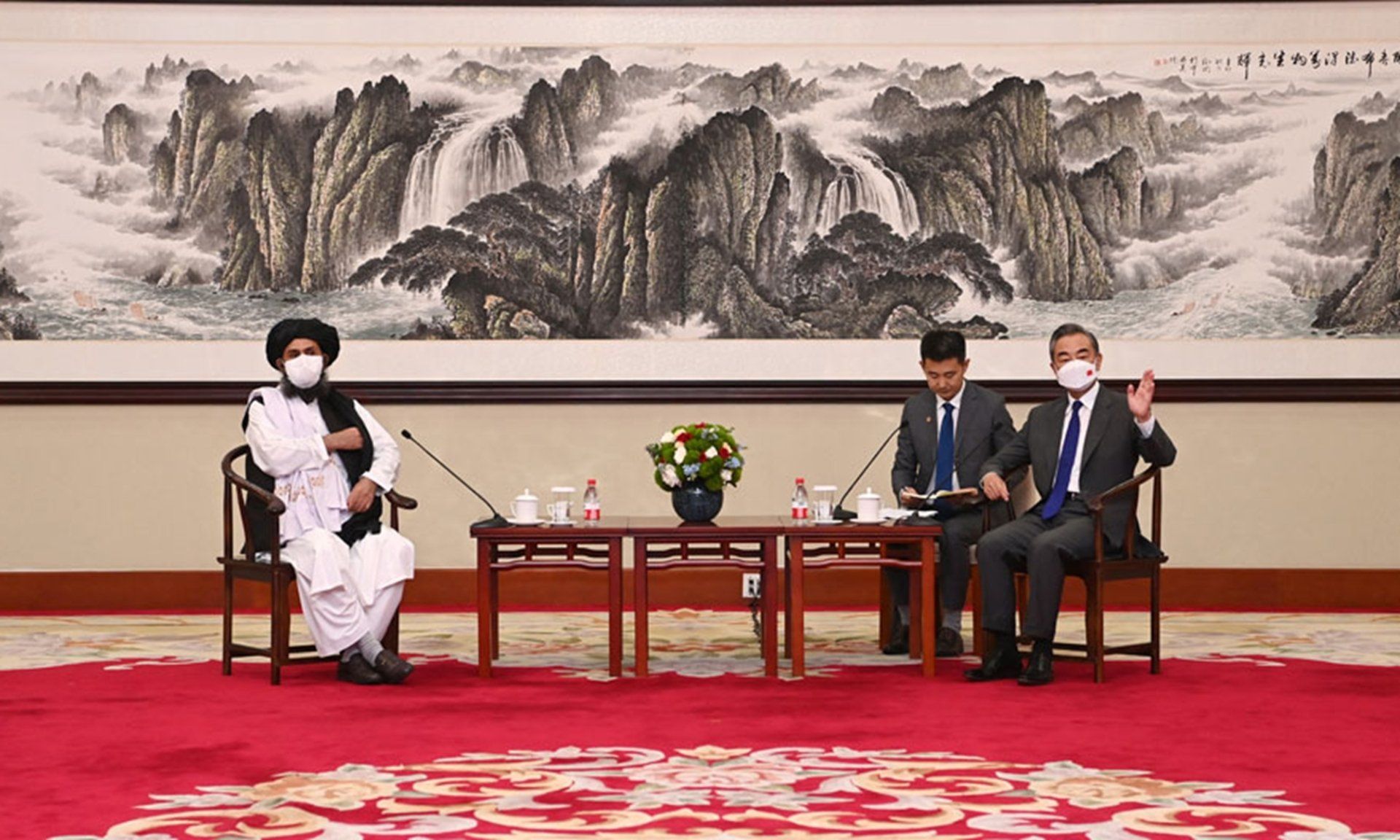
^ a meeting between Chinese Foreign Minister Wang Yi and a Taliban delegation led by Mullah Abdul Ghani Baradar on 28 July, 2021 (Source: Global Times/Chinese Foreign Ministry)
Russia
The Russians are no strangers to quagmires in Afghanistan; between 1979 and 1989, the Soviet Union was embroiled in its own military misadventure in the so-called ‘graveyard of empires’. Earlier still, Afghanistan became a crucial chess square in the ‘Great Game’ played across Asia between Russia and Great Britain.
Policymakers in Moscow appear to have approached the current situation with cautious optimism. On the one hand, Moscow welcomes the fact that Washington’s humiliation in Afghanistan has diminished American gravitas, and new opportunities for Russia to engage with Asian partners economically and diplomatically may present themselves. Indeed, the Taliban have been invited to Moscow to discuss the future of Afghanistan. On the other hand, if security in Afghanistan unravels, Russia’s Central Asian allies will have a headache on their southern borders which may also trouble the Kremlin.
Historically, Russia has had a mixed relationship with the Taliban. In 2003, it labelled the Taliban a terrorist organisation but kept backchannels open to engage with the group. In 2007, Russia quietly held talks with the Taliban to discuss curtailing drug trafficking from Afghanistan to Central Asia, but just two years later, Russia opened its airspace for the US to conduct airstrikes against them. The following year, the Russians also collaborated with the US on counter-narcotics operations. However, in 2015, with the emergence of Islamic State – Khorasan Province (IS-K), the Kremlin was again quietly considering the Taliban as a potential partner, mainly to prevent the growth of IS-K. This prompted accusations from both Kabul and Washington that Russia was aiding and abetting the Taliban to the detriment of Afghanistan’s security. Most notably, the commander of US forces in Afghanistan, General John Nicholson, alleged in 2018 that Russian weapons had been smuggled and supplied to the Taliban.
The history indicates Moscow has employed a mixed strategy of accommodation and deterrence towards the Taliban. By maintaining a workable, albeit tenuous, relationship with the Taliban, Russia has kept open options to undermine the US presence in Afghanistan, combat security threats stemming from other groups like IS-K and impose some influence over the country’s future direction. For now, this strategy is likely to endure.
On 25 September, Russian Foreign Minister Sergei Lavrov said that the Taliban would not receive international recognition. Nevertheless, the Kremlin is willing to cooperate with the Taliban on some issues. Earlier in September, President Vladimir Putin commented: ‘the sooner the Taliban will enter, say, the family of civilized peoples, the easier it will be to contact, communicate and somehow influence.’ Before the Taliban took power, Russia even welcomed a delegation to Moscow in July.
Moscow has ruled out direct military cooperation with the Taliban but Russia, like other states to whom the wider region is strategically important, has an interest in seeing a stable Afghanistan come into fruition. Militancy and terrorism could spread northwards towards Tajikistan, Kyrgyzstan, and Kazakhstan, all Russian allies within the framework of the Collective Security Treaty Organisation (CSTO). If the security situation deteriorated in Afghanistan to the point where there was spill over northwards, Russia would likely have to intervene in some way, probably through the CSTO’s Collective Rapid Reaction Force.
Tajikistan, Kyrgyzstan, and Kazakhstan have taken different approaches to Afghanistan. Kazakhstan has largely followed Russia’s lead and Kyrgyzstan have already sent a delegation to Kabul on 23 September. Tajikistan, however, is more hostile towards the Taliban. Reportedly, senior Afghan figures who oppose the Taliban have fled to Tajikistan to form an Afghan government in exile. Among them is believed to be National Resistance Front leader Ahmad Massoud and former vice president Amrullah Saleh, as well as a wider group of Afghan National Army officers, National Resistance Front members, and former officials from Ashraf Ghani’s deposed government. Abdul Ghani Baradar, the acting head of the Taliban, has complained that Tajikistan is interfering in Afghanistan. If exiled Afghans were to launch an insurgency against the Taliban from Tajikistan, this could provoke fighting across the border, which would likely push Tajikistan to invoke the CSTO’s common defence principle and drag Russia into an unwanted debacle. Russia therefore has an interest in ensuring the Taliban upholds certain security assurances and does not infringe on its northern neighbours.
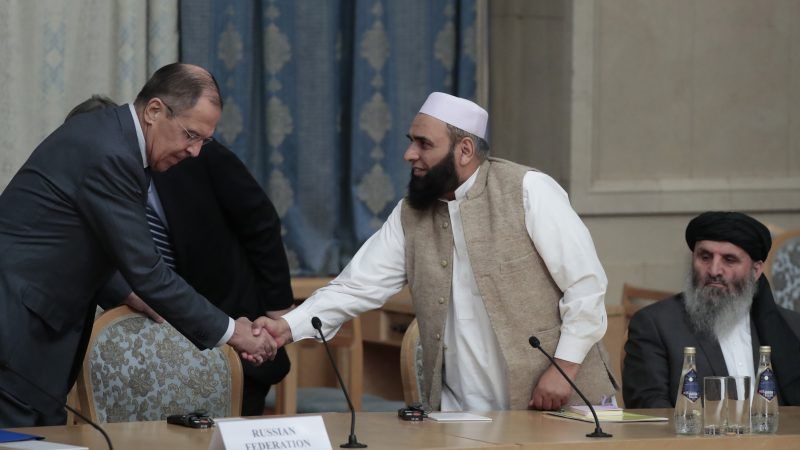
^ Russian Foreign Minister Sergei Lavrov meets with a Taliabn delegation on 9 November 2018 (Source: Euractive)
Iran
Historically, Tehran and the Taliban have shared a fraught relationship. In 1998, Iran almost went to war with Afghanistan after the Taliban murdered eleven Iranian diplomats and a TV correspondent. However, Tehran’s position on the group has softened after two decades of war between the Taliban and long-time rival of Iran, the US. Iran’s new president Ebrahim Raisi has welcomed the Taliban victory, saying: ‘America’s military defeat must become an opportunity to restore life, security, and durable peace in Afghanistan.’ The Iranian embassy has been one of the few diplomatic posts to stay open in Kabul since the Taliban takeover in August, and it seems likely that Tehran will try to build a mutually beneficial relationship with the new government there.
Officials in Tehran perceive several geostrategic, diplomatic, and economic opportunities in Taliban-ruled Afghanistan. Washington’s messy exit from the country and its failure to pacify the Taliban after twenty years feeds neatly into Iran’s informational efforts to discredit American involvement in the Greater Middle East region. Indeed, Ali-Akbar Velayati, Ali Khamenei’s foreign affairs adviser, has said that Afghanistan has become a part of the Iranian-led ‘Axis of Resistance’. This so-called axis loosely refers to Iran’s network of allies and proxies in the Greater Middle East it relies upon to deter rivals and spread its influence.
Although Iranian state media and leading officials have been keen to promote the Taliban’s victory as a crushing blow to the US, there is no guarantee that the Taliban’s policies will align with Iranian interests. When the Sunni Muslim Taliban were previously in power, they took a hard line against Afghanistan’s Shi’a Muslim minorities. The Hazara, who are predominately Shi’a and constitute 10-15 percent of the country’s population were subjected to harassment, torture, and killings by the Taliban.
Iran, which has promoted an image of itself as the guardian of all Shias, would struggle to turn a blind eye if the Taliban were to repeat these policies. There have already been reports of the Taliban massacring ethnic Hazaras this year. For now, the issue has not come to the forefront of international attention but there is a risk of escalation. Either Tehran would have to ignore the issue and risk alienating its network of Shi’a militias upon which it relies heavily or intervene and risk entanglement in Afghanistan. Consequently, in future talks with the Taliban, Tehran will probably push heavily for assurances that the Taliban respect its Shi’a minorities.
Iran does possess assets in Afghanistan which it could use to address short term tactical challenges or longer-term strategic concerns arising from the Taliban takeover. Chiefly, Iran’s Islamic Revolutionary Guards Corps (IRGC) recruits, trains, and arms the Fatemiyoun Brigade. The Fatemiyoun’s recruits are primarily drawn from Afghanistan’s Shi’a Hazaras, from both communities living in Afghanistan and the diaspora in Iran. Tehran have kept the Fatemiyoun Brigade busy fighting in the Syrian Civil War, where they have gathered extensive experience, but many veterans are now returning to their homes in Afghanistan and Iran. Afghan journalist Sami Yousfzai has noted that they are ‘already very active in Afghanistan and their influence in growing in Shi’a areas.’ Depending on the situation, Tehran could leverage the brigade against adversaries in Afghanistan like IS-K, or the Taliban if relations between Iran and the new Afghan government were to break down.
For now, however, Tehran is hoping to acquire diplomatic and economic dividends in Afghanistan. Iranian fuel exports to Afghanistan have continued since the Taliban takeover and the latter have reportedly reduced tariffs on Iranian exports by one eighth. This is certainly good news for Iran, whose economy has been repeatedly battered by sanctions. Aladdin Mir-Mohammad-Sadeghi, the vice-president of the Iran-Afghanistan Joint Chamber of Commerce’ has said: ‘if the promises made by Taliban officials are kept, bilateral trade could reach $3 billion.’
In terms of diplomacy, Iran stands to benefit from the vacuum left by the US. Now that the Americans no longer have a firm footing in Afghanistan, non-Western powers will increasingly determine the country’s future. President Raisi has already expressed an interest in working with Russia and China to address regional issues arising from Afghanistan. Coordinating with China in particular, offers Iran an opportunity to build further on the China-Iran Comprehensive Strategic Partnership established earlier this year.
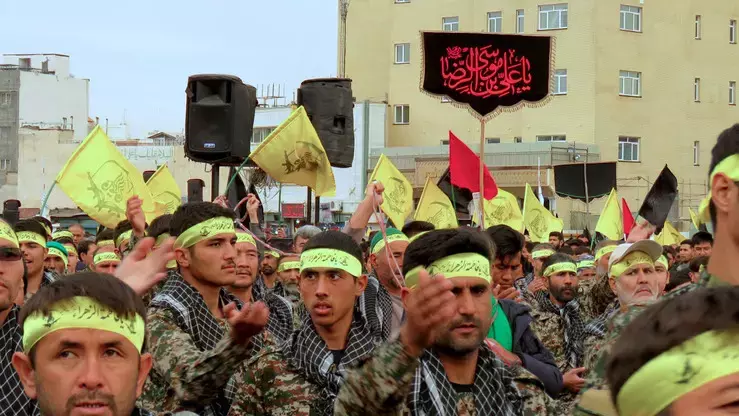
^ Members of the Fatemiyoun Brigade gathered in Mashhad, Iran, in October 2019 (Surce: Salaam Times)
Pakistan
Owing to the fact that Afghanistan shares its longest border with Pakistan along the Durand Line, Islamabad has the most to gain or lose from the Taliban takeover. Of all the state actors with interests in Afghanistan, it is Pakistan which possesses the greatest scope to communicate with the Taliban, which may grant Islamabad a unique source of leverage. However, should the security situation in Afghanistan devolve, or if the Taliban victory were to embolden Pashtun nationalists and Islamist militants, Pakistan faces the greatest share of risks emanating from the volatile country.
Pakistan has access to the most concrete channels of communication to the Taliban. Pakistan supported the Taliban from around 1994 until the aftermath of the 9/11 attacks made this geostrategically unviable. However, it is widely believed that Pakistan resumed its support for the Taliban sometime during the War in Afghanistan, despite nominally being a non-NATO ally of the US. Islamabad has always strongly denied these claims, but many analysts have alleged that Pakistani security apparatuses such as the Inter-Services Intelligence (ISI) have provided the Taliban with military training, funding, and logistics support.
Prime Minister of Pakistan Imran Khan has publicly praised the Taliban, having commented just a day after Kabul fell that the Taliban were ‘breaking the chains of slavery.’ The reasons for Islamabad to welcome the Taliban takeover are twofold: firstly, it presents an opportunity to gain regional and international influence; and secondly, Pakistan can more effectively balance against India.
Many of the states who wish to exert influence over Afghan affairs have a very poor or almost non-existent relationship with the Taliban. For Pakistan, this presents an opportunity to become a more instrumental player in the region by acting as a bridge between other states and the new Taliban government. This could be especially advantageous for Pakistan if the Afghan security situation stabilises sufficiently to allow for the country to reach its potential as an important energy corridor between South and Central Asia. Bigger players like Beijing may have to rely in part on Islamabad’s diplomatic connections to the Taliban to facilitate future economic projects. Of course, this depends a great deal on the nature of Taliban governance and whether state actors are willing to work with them, but there are early signs that major non-Western players are willing to do so, albeit cautiously.
The greatest boon for Pakistan in terms of security and geostrategic positioning is the removal of a government more sympathetic to New Delhi than Islamabad. Since the US invasion, India has enjoyed good relations with successive Afghan governments. For example, the now-exiled Afghan president Ashraf Ghani was keen to establish closer economic and defence ties with India. This was a serious concern for Pakistan, who has endured a tense rivalry with India since the partition of the two in 1947. A pro-Indian government in Kabul would effectively entail the geostrategic encirclement of Pakistan. Pakistan also feared that a non-aligned Afghanistan, with the help of India, might construct dams along key rivers and thus threaten Pakistan’s water security. Strategists in Islamabad will therefore find New Delhi’s relatively underdeveloped relationship with the Taliban more reassuring than when the previous government held Kabul.
However, Islamabad’s relationship with the Taliban is not entirely friendly. A dispute over the border between Afghanistan and Pakistan could derail the latter’s ability to leverage the Taliban takeover for geostrategic gains. Successive Afghan governments have refused to recognise the Durand Line as the international border between the two countries. This is chiefly because a significant number of Pashtuns, who constitute roughly 42 percent of the Afghan population, live on the Pakistani side of the Durand Line, primarily in the province of Khyber Pakhtunkhwa. Pashtun nationalism has long been a source of anxiety for Islamabad. Whilst it remains exceedingly unlikely that Afghanistan will recognise the Durand Line, Pakistan will prioritise securing assurances from the Taliban that they will at least pledge not to infringe on the border.
Even if the Taliban do give assurances to Islamabad that they will not allow Afghan soil to be used for attacks against Pakistan, it is unclear how far they will go – if at all – to reign in other militant groups. In a recent interview, former Pakistani ambassador Hussain Haqqani warned that the Tehrik-i-Taliban Pakistan (TTP/Pakistani Taliban) ‘would like to replicate what happened in Afghanistan in at least the Pashtun areas of Pakistan’. The TTP, who are a separate entity to the Afghan Taliban, have certainly been emboldened by the latter’s success, as the TTP have been ramping up attacks in Pakistan since Kabul fell. How far Islamabad can leverage events in Afghanistan in its favour will therefore depend heavily on whether the Taliban’s rise to power will empower militants operating along Pakistan’s porous Afghan border regions.
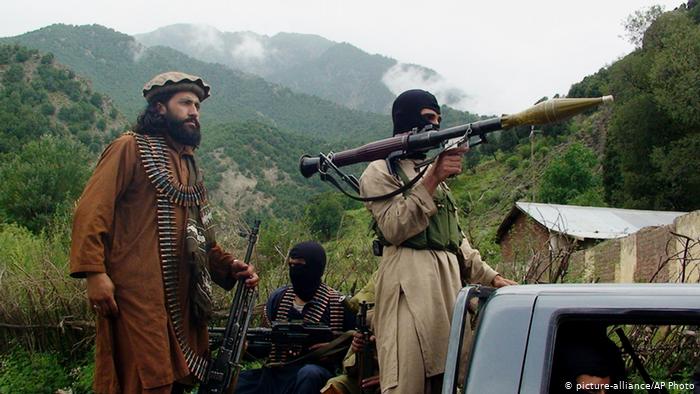
^ members of the Pakistani Taliban pictured in 2012 (Source: DW)
India
India’s interests in Afghanistan are threefold: to prevent Pakistan from gaining influence; prevent the rise of an Afghan government with anti-Indian sentiments; and to limit the spread of militant Islamism in the wider region. The rise of the Taliban threatens all of these interests.
India and Pakistan have a long history of meddling in Afghan affairs to secure strategic and tactical advantages over each other. The last time the Taliban were in power, Pakistan gained an edge against India in terms of its influence in the country. India was therefore willing to support the Northern Alliance in 2001 when it was backed by the US to remove the Taliban from power. After the Taliban were toppled, New Delhi enjoyed good relations with successive governments in Kabul, much to the chagrin of Islamabad. However, with the Taliban back in power, India’s influence in Afghanistan is likely to wane.
The fact that the Pakistani ISI has ties to the Taliban does not bode well for India. New Delhi tends to view the Taliban as nothing more than a proxy of Pakistan. This is not true, given the fact that the Taliban themselves could threaten Pakistan’s territorial integrity if they were to support an independent Pashtunistan; nevertheless, Pakistan exercises a sufficient degree of influence over the Taliban to give India a legitimate cause for concern.
Another issue is that a Taliban victory may embolden Islamist militants elsewhere. For decades, India has confronted an insurgency in its Muslim-majority Kashmir region. Jaish-e-Muhammad and Lashkar-e-Taiba, two Islamist militant groups active in the region, have a historical connection with the Taliban and approximately 6,000 to 6,500 of their members have gained battlefield experience fighting in Afghanistan, according to one UN report. Militants in Kashmir and elsewhere in India may now find they have an easier time planning and securing resources for attacks if Afghanistan becomes a safe base to operate from.
The Taliban have not however, publicly indicated ill intent towards India. In fact, on 31 August, Indian ambassador Deepak Mittal met with the head of the Taliban’s Doha office Sher Mohammad Abbas Stanekzai in Qatar. Stanekzai later indicated to the media that the Taliban want to create close economic and political ties with India. Officials in New Delhi are certainly concerned about the Taliban takeover, but there may be some scope for India to form a relationship with the Taliban if it means that they can protect their interests in the region. If for example, Pakistan and China were able to work with a relatively stable Taliban-ruled Afghanistan and India were not; New Delhi could find its access to important resources from Central Asia put in jeopardy.
India does possess the tools to build a working relationship with the Taliban in Afghanistan. India is the fifth largest aid donor to Afghanistan and has spent over $3 billion on infrastructure projects like roads, dams, and electricity transmission lines, as well as on basic public service providers such as schools and hospitals. By presenting itself as a neutral party who can provide valuable economic assistance, India could secure economic and diplomatic gains in Afghanistan.
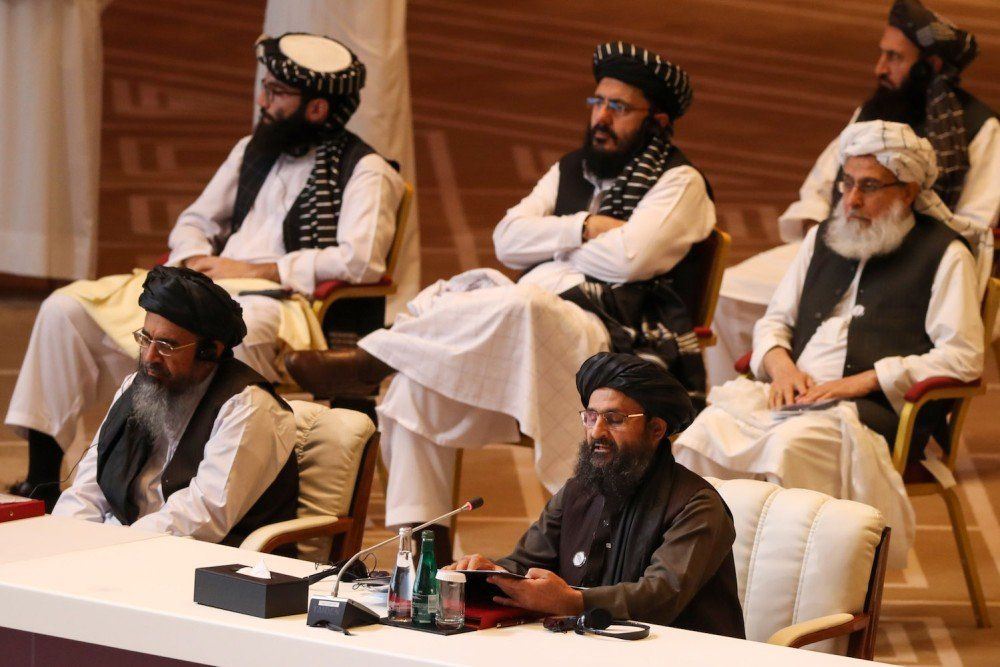
^ a Taliban delegation led by Mullah Abdul Ghani Baradar at peace talks between the Afghan government and the Taliban in Doha on 12 September 2020 (Source: Karim Jaafar/AFP/Getty Images)
Conclusion
For some non-Western powers, particularly China, Russia, and Iran, the US’s exit from Afghanistan presents opportunities to gain a stronger footing in the country. However, even for states with links to the Taliban, like Pakistan, the new government is hardly an ideal partner. Other states may be more willing to form a working relationship with the new Taliban government than those in the West but cooperating with a group which is notorious for extremism and terrorism will not be easy. For now, most non-Western powers with interests in Afghanistan are unlikely to explicitly recognise the Taliban, but they will begin to forge informal links with the group so that they are not shut out by their strategic competitors. How the Taliban itself chooses to rule will largely determine how strong those links can become.











